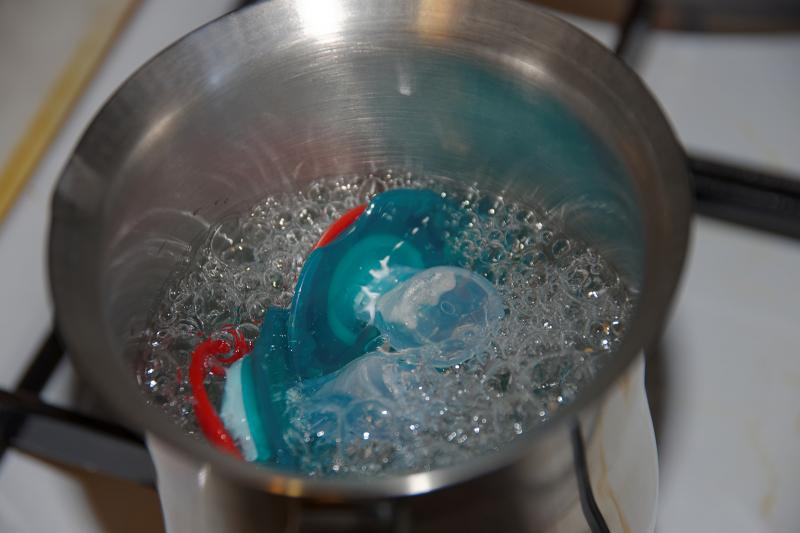The importance of air quality cannot be overstated, especially in enclosed spaces. The spread of airborne illnesses and contaminants can quickly affect the health of those in close proximity. To combat this, there are many methods for disinfecting the air. In recent times, people have wondered if boiling bleach and water is effective in disinfecting indoor air.
Understanding Bleach
Bleach is a solution comprised of sodium hypochlorite or calcium hypochlorite and can be used to whiten clothes or clean surfaces. It works as a disinfectant by breaking down proteins, killing viruses, bacteria and germs. Its effectiveness stems from its high pH levels that make it difficult for microorganisms to survive.
Is Boiling Bleach Safe?
Boiling bleach is not safe as it can release toxic fumes which pose serious health hazards to humans. Mixing bleach with other chemicals such as ammonia or vinegar also lead to the creation of hazardous gases like chloramines and chlorine gas which could produce nausea and vomiting among other symptoms.
When heating bleach in large amounts (at least 15-30 gallons), the process must only occur outside where there is proper ventilation so that dangerous toxins don’t collect inside closed rooms where people breathe.
Before cleaning with bleach, use gloves and ensure adequate ventilation within your space. Additionally, avoid contact with skin or eyes when working with bleach, as direct exposure could cause irritation or chemical burns.
Benefits And Drawbacks To Using Bleach For Air Disinfection
Like any method of cleaning or sterilisation, using bleach for air disinfection has both benefits and drawbacks:
Benefits:
- Bleach kills most types of bacteria effectively
- Effective against molds
- Has been shown to prevent mold growth
Drawbacks:
- Toxic fumes produced when overheated
- May trigger breathing problems because of harsh chemicals released into the atmosphere
- Risky when misused, don’t use on porous surfaces such as cloth or wood
Compared to other common methods of air disinfection like ultraviolet technology, essential oils, and ionizers, bleach is cost-effective and easy to use. However, its toxicity when misused can outweigh its benefits.
What Do Health Experts Say About Boiling Bleach?
Health experts have come out to warn against boiling bleach due to the hazards it causes human health. The Centers for Disease Control and Prevention (CDC) advise that only diluted solutions should be used when cleaning surfaces since bleach-based compounds contain harmful chemicals that could aggravate breathing problems.
Other experts cite the Environmental Protection Agency’s “Safer Choice” label which indicates products that are capable of supporting public health while still remaining environmentally friendly. This means using safer cleaning methods in homes including natural/organic options or HEPA filters.
Alternatives To Boiling Bleach
Alternative disinfecting methods are recommended by experts since they pose less risk than boiling bleach. These may include:
Ultraviolet (UV) Radiation Technology
UV light cleans the air by applying photons that disrupt microorganisms’ DNA, stopping them from reproducing. Unlike traditional cleaning methods like bleaching or steam cleaning, UV light does not require harsh chemical exposure.
HEPA Filters
High-efficiency particular air (HEPA) filters work by trapping particles in the air — such as dust, bacteria and mold spores —and producing clean air in return.
Natural/Organic Solutions
Another option includes using natural or organic solutions such as diffusing essential oils like tea tree oil or eucalyptus oil into the room. Essential oils have natural antimicrobial properties which help kill bacteria and viruses.
Best Practices For Disinfecting Indoor Air
In addition to standard cleaning practices such as dusting and wiping down counters with a damp cloth regularly, there are specific measures one can take to maintain good indoor air quality. These may include:
Proper Ventilation
Ensuring proper ventilation within your space can help eliminate stale or harmful air and remove impurities. Open windows, use fans for circulation, consider using mechanical ventilation systems.
Efficient Use of Air Purifiers
Using air purifiers with HEPA filters that remove pollen, dust, smoke, viruses, and bacteria could greatly improve indoor air quality.
Regular cleaning practices
Regularly clean surfaces that are often touched like doorknobs or light switches with a solution of water and vinegar since it is mild in nature yet effective at removing dirt and grime.
Conclusion
Although it’s tempting to resort to boiling bleach as a quick-fix method for disinfecting the air, it is not an option recommended by health experts. Bleach when not properly diluted or heated can release harmful toxic fumes which lead to respiratory problems and other health issues.
Experts instead recommend safer alternatives like using organic solutions, HEPA filters or UV technology as these carry fewer risks while still being effective in decontaminating indoor air quality. Proper ventilation and regular cleaning also aid in reducing pollutants in enclosed spaces. By adhering to these best practices for indoor air quality maintenance one can live healthier lives without posing any undue risk of significant harm from chemicals used for cleaning purposes inside their homes or offices.
Q&A
- Q: Can boiling bleach and water really disinfect the air in my home? A: While it may seem like a quick and easy solution, boiling bleach and water to disinfect the air is not a safe or effective method. Inhalation of bleach fumes can cause serious respiratory irritation and damage.
- Q: Is there a safer way to disinfect the air in my home? A: Yes, there are various safe and effective ways to disinfect the air in your home. These include using HEPA filters, regularly opening windows to circulate fresh air, and using essential oil diffusers with antibacterial properties.
- Q: Why do some people believe boiling bleach and water can disinfect the air? A: There may be misconceptions or misinformation surrounding this method of disinfection. Some may have heard that boiling a mixture of vinegar and baking soda can effectively clean surfaces, but this does not translate to the same process for disinfecting the air.
- Q: What are the dangers of inhaling bleach fumes? A: Inhaling bleach fumes can cause significant harm to the respiratory system, including coughing, wheezing, chest pain, shortness of breath, and even chemical pneumonia. It is important to always follow proper safety precautions when handling cleaning chemicals.





